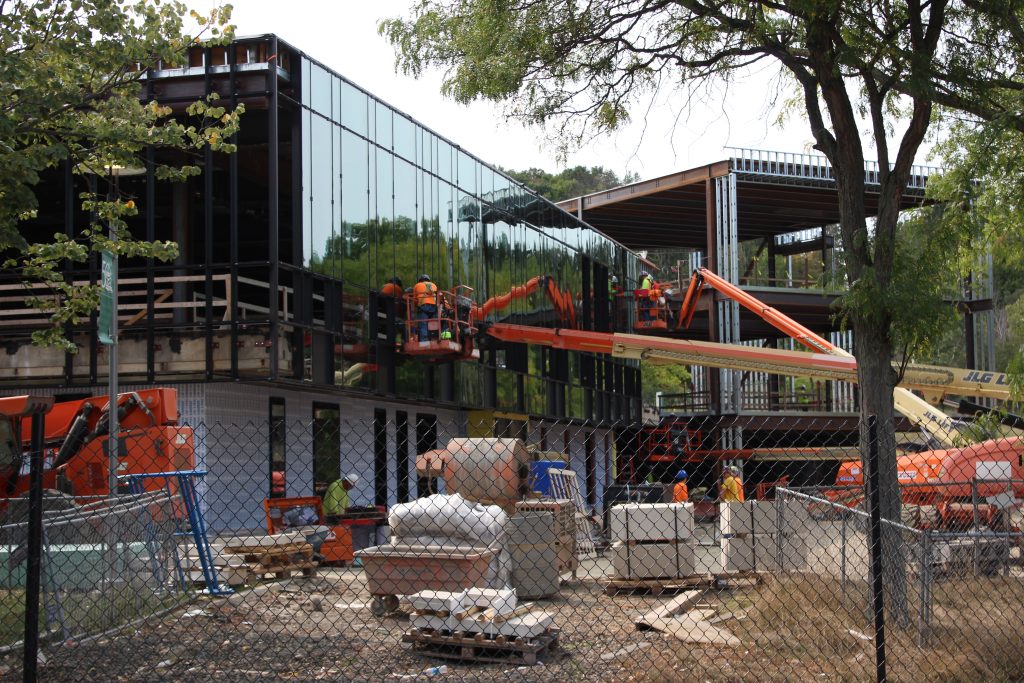Despite challenges the coronavirus pandemic has presented, Binghamton University is attempting to keep the construction of several on-campus projects running smoothly.
Physical Facilities, a branch of BU that deals with the upkeep of buildings and sanitation, has been at the forefront by implementing social distancing measures seen across campus, such as hand sanitizer dispensers, floor decals directing one-way traffic and queue barriers in the University Union and dining halls. The department has also been deeply involved with on-campus construction projects, including the recent overhauls to the University Union basement and Engineering Building.
There were several construction projects already underway when the onset of COVID-19 in March forced the majority of BU students to return to their homes. Some of these projects have remained on track to be completed based on original estimates while others have been slightly delayed.
Karen Fennie, communications specialist at Physical Facilities, said that most projects have managed to stay on schedule.
“There were a couple of projects where schedules slipped a month or two,” Fennie wrote in an email. “For example, the Science IV phase 2 project was supposed to start in June but started in August instead.”
The renovations to the Hinman Dining Hall have caused a visible change to the BU campus since it is one of BU’s four principal dining halls and has been closed for more than a year. Fennie indicated that the project is still very much in progress.
“The Hinman [Dining Hall] project is very active with the contractor working on pouring floors for the addition along with constructing walls and infrastructure in the original part of the building,” Fennie wrote. “Completion is August 2021, which is in line with the original schedule.”
Over the summer, Physical Facilities has remained active in continuing projects that had already begun. The new site for the Decker College of Nursing and Health Sciences at 48 Corliss Ave. in Johnson City is nearly done, with projections to be completed during the month of October. Faculty will begin to move into the building in mid-January.
Science II was also worked on extensively over the summer, with both exterior renovations being completed as well as new classrooms being constructed on the interior.
Renovations to the Engineering Building were fully completed in August. Other projects included an addition to the Institute for Child Development, improved lighting at the East Gym, paving and general maintenance.
Despite renovations, some students have mixed feelings about the state of the construction work. Briana Mannarino, a junior double-majoring in psychology and theatre, lives on campus and sees the construction work every day.
“I feel like they started doing too much at once,” Mannarino said. “Between the Hinman Dining Hall, College-in-the-Woods residence halls and science buildings, it feels like no progress has been made, and it’s taking way longer than if they maybe did one or two projects.”
Mannarino also indicated that the University should be looking to improve other areas of campus.
“They really need to update [the Fine Arts Building],” Mannarino said. “The entire building needs to be gutted and redone completely since it’s so old, and there were so many asbestos warnings these past two years.”
During his annual State of the University Address in 2019, BU President Harvey Stenger noted there was a plan for the Fine Arts Building to be renovated, but budgetary allocations had not been made. No further development to the plan has been announced since then.
Ian Bezdicek, a junior majoring in chemistry, works as a lab teaching assistant in the physics department. Physics labs take place in Science II, a building that’s been impacted by construction.
“It’s been difficult to adjust to the constant switching and movement of rooms in Science II,” Bezdicek said. “Because of [coronavirus]-related delays, it’s been a struggle to make sure lab goes smoothly.”
As far as plans for future construction projects, much of the decision-making is out of the University’s hands.
“It’s really dependent on decisions that are made in Albany and the state budget as far as what money will be available,” Fennie said. “We have not received any timeline regarding when decisions might be made.”



